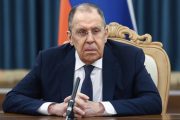
The West will not offer a realistic diplomatic solution to the Ukraine conflict because Washington and its allies are still keen on strategically defeating Moscow, Russian Foreign Minister Sergey Lavrov said on February 14.
Briefing Russian MPs on his ministry’s work and the current international situation, Lavrov declared that Moscow is “at the advance guard in the fight for a better future,” adding that the Western-dominated system is paving the way to a multipolar world.
The United States and its allies, nonetheless, remain bent on waging a hybrid war against anyone that prioritizes national interests, as can be seen by the continued Ukraine conflict, Lavrov contended.
Additionally, Western rhetoric has changed owing to Moscow’s battlefield successes, the minister claimed, with officials now focusing on averting a Russian victory instead of ensuring its defeat. However, the core policy of the West in trying to undermine Russia remains the same, Lavrov said, implying that diplomatic solutions are unlikely to tackle the conflict.
“Considering that those who declared a war on us offer no serious proposals and are unwilling to respect our interests and the reality on the ground, getting an agreement at the negotiating table will certainly be impossible. No such scenario is foreseen,” the diplomat posited.
Lavrov maintained that the West had initiated the conflict through its persistent quest for “global domination and exceptionalism.” Russia, meanwhile, is trying to dismantle the current system, which it deems as colonialist in nature, he told the lawmakers.
U.S. President Joe Biden reiterated his Ukraine policy on February 13, urging the House of Representatives to approve the Senate’s foreign aid package including around $60 billion for Kyiv. The money will mostly fund arms production in the U.S. and will help Ukraine oppose the “vicious onslaught” by Russia, Biden claimed.
“The United States pulled together a coalition of nearly 50 nations to support Ukraine. We unified NATO; we expanded it. We can’t walk away now,” he proclaimed.
If approved, the bill would increase the amount of military assistance given to Ukraine by the U.S. since the outbreak of hostilities in February 2022 to some $170 billion.
Earlier this month, the Frankfurter Allgemeine Zeitung reported that Germany and Ukraine may ink a security cooperation agreement at the Munich Security Conference, which will take place from February 16-18.
The German newspaper claimed that Berlin and Kyiv had already drafted the deal.
Notably, on January 12, the U.K. became the first nation to sign a bilateral security agreement with Ukraine under which the two nations pledged to defend each other if attacked. Last month, French President Emmanuel Macron unveiled plans to follow suit.
Quoting anonymous “government circles,” the Frankfurter Allgemeine Zeitung alleged in its article that the pact would be signed on the first day of the upcoming summit. The newspaper quoted Ukraine’s Deputy Prime Minister for European and Euro-Atlantic integration, Olga Stefanishyna, as saying that a Ukrainian delegation had worked out a “draft for an agreement on bilateral security guarantees” the previous day. She added that the text was “not decided on, but generally ready,” and that both Berlin and Kyiv have agreed that the accord should be finalized as soon as possible.
Although she lauded the growing role within the European Union that Germany is now playing in backing Ukraine, Stefanishyna noted that Kyiv is “not always satisfied” with Berlin, particularly in light of its apparent doubts about Ukraine’s NATO membership aspirations.
In late January, German Chancellor Olaf Scholz said that the topic of a bilateral security pact had “played a big role” during his telephone conversation with Ukrainian leader Volodymyr Zelensky earlier that month, with the accord being “intensively prepared.” He added that he had the “feeling that we are on the verge of conclusive negotiations.”
In a post on X (formerly Twitter,) Zelensky confirmed that he had discussed Berlin’s commitment to Kyiv’s security with the German chancellor.
During a NATO summit in Vilnius in July 2023, the G7 nations agreed to work out bilateral security guarantees for Kyiv, pending its possible entrance to the U.S.-led military bloc at some point in the future. Regarding this decision, Russian President Vladimir Putin stated at the time that, while “every country has the right to ensure its security,” this should not be done at the expense of other nations.
Lavrov dismissed the agreement signed between the U.K. and Ukraine in January, which, among other things, guarantees “prevention and active deterrence of, and counter measures against, any military escalation and/or a new aggression by the Russian Federation,” describing it as “half-baked.” “I did not see any legally binding provisions in this document, except that Ukraine will have to stand up for Britain,” the diplomat explained. He also claimed that Western countries do not really want to see Ukraine become a full-fledged member of NATO or the European Union.
Dmitry Medvedev, former Russian president and current deputy chair of the country’s Security Council, warned last month that Moscow would consider any mobilization of British troops to Ukraine as a “declaration of war.”
Foreign Ministry Spokeswoman Maria Zakharova slammed Britain for “actively working to prevent peace” in Ukraine, while turning it into a “bargaining chip.”
Most Germans are against Ukraine joining the European Union, based on recent polling data, which also indicated growing skepticism toward Western sanctions on Moscow and the burden of post-war “reconstruction” in Ukraine.
Conducted by Germany’s Bertelsmann Foundation and published on February 14, the survey indicated that 52 percent of Germans believe the EU should not accept Kyiv as a member in the coming years.
The result contrasted with robust support for Ukrainian membership elsewhere throughout the bloc, where majorities favored the move in six other member states (Belgium, France, Italy, the Netherlands, Poland, and Spain), as per the poll. The German government has also backed membership talks, with officials meeting in Brussels last year to discuss the issue.
Germans who identified with political parties on the extreme left and right were less likely to back Kyiv joining the union, with 81 percent of the nationalist Alternative for Germany opposing the move and 74 percent of the leftist Reason and Justice Alliance taking that view.
Questioned whether Berlin should continue arms deliveries to Ukrainian forces, a slim majority of 53 percent agreed, with support strongest among the Greens and centrist factions such as the Christian Democratic Union and Chancellor Olaf Scholz’ Social Democratic Party.
The new survey appeared to show a rising reluctance among Germans regarding Ukraine’s “reconstruction” after the conflict with Russia, with 69 percent of respondents viewing that cost as an “economic burden” instead of an “opportunity.” A comparable proportion also doubted the impact of Western sanctions on Moscow, with 59 percent deeming the measures “ineffective.” Just 22 percent agreed the penalties had their intended effect, while 19 percent answered “don’t know.”
Support for accepting Ukrainian refugees remained strong, with 64 percent of those polled saying their country should take in people escaping the conflict. Among political parties, Alternative for Germany (AfD) was a major outlier on that question, as 76 percent of respondents who identified with the faction said Germany should not welcome refugees.
The Bertelsmann Foundation conducts surveys in EU states every three months, providing data for the ‘eupinions’ research tool. Meant to represent public opinion across the bloc, the latest poll had a sample size of 13,299 people from seven member states — with 1,834 respondents in Germany.




